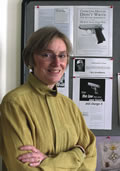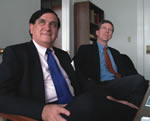

10 years after 101 California Street shooting, repercussions reverberateBy Nancy McCarthy A decade has passed since Gian Luigi Ferri, a heavily-armed 55-year-old with a simmering grudge, calmly walked into a downtown granite and glass highrise in San Francisco, determined to wreak revenge on a law firm that had represented him years earlier. Carrying two 9mm semiautomatic IntraTec-9s, a .45 caliber pistol and hundreds of rounds of ammunition, it took Ferri just 15 minutes to kill eight people and wound six in the worst mass shooting ever in San Francisco. Three of the dead were lawyers and a fourth was a law student. Ten years later, despite ongoing bitter legislative battles over gun control, guns are used to kill 29,000 Americans annually. But the horror of the July 1, 1993, events at 101 California St. had far-reaching repercussions:
"This really was one of the very first mass shootings in a workplace," said Michelle Scully, whose husband, John, died that day in the offices of Pettit & Martin, where he was a 28-year-old associate. "It happened in a highrise, to a very prestigious law firm in a major city in the U.S. It was a shocking event, not only to us but to the whole country. It instilled a fear that you're not safe anywhere." The gun control debate was well underway in Washington at that time, given impetus by a 1989 shooting at a Stockton schoolyard. Sen. Dianne Feinstein, who herself took office as mayor of San Francisco as the result of the shooting death of Mayor George Moscone, led the effort to ban assault weapons at the federal level. The legislation blocked domestic manufacture and sale of 19 specific models and became law 14 months after the 101 California massacre, succeeding against heavy odds. Dennis Henigan, legal director of the Brady Center to Prevent Gun Violence, recalled the "single most dramatic testimony in favor of the ban was given by Steve Sposato, who testified before a Senate committee with his daughter strapped to his back." Sposato's wife, Jody Jones Sposato, mother of a 10-month-old daughter, was slain at 101 California. "It's really not an overstatement to say the 101 California shooting led directly to the (federal) assault weapons ban," Henigan said. Since 1994, many gunmakers have simply altered their products' features to get around the ban, leading critics to charge that the law has been ineffective. Henigan disagreed. "Ten years ago, the gun industry was pumping hundreds of thousands of these weapons into the stream of commerce every year," he said. "That supply has been cut off. It was a major public policy advance that we at least shut off the continued supply of assault weapons." The legislation expires Sept. 14, 2004, and faces an uphill battle in Congress, despite President Bush's stated support for an assault weapons ban. At press time, House majority leader Tom DeLay said the law would not be renewed and Democrats were challenging Bush to overcome resistance in his party to the ban. The Gun Owners of America calls the ban "completely unconstitutional and opposed by millions of Americans." Also pending in Washington was legislation, considered likely to pass, to broadly prohibit most civil lawsuits against gun manufacturers, distributors, trade associations and dealers. The legislation would require the immediate dismissal of most pending lawsuits against the gun industry. Soon after the 101 California St. shooting, Henigan represented eight victims and their survivors in a lawsuit against Navegar, the company that manufactured the TEC-9 used by Ferri. The suit marked the first time plaintiffs tried to hold a gun manufacturer responsible for shooting deaths on a traditional negligence theory, and, said Henigan, it was the first to focus on the problem of assault weapons. The case ultimately was lost in 2001 at the California Supreme Court, which ruled the case fell into the category of product liability and the legislature specifically exempted the gun industry from those types of suits. The resulting public outcry led to legislation that repealed the immunity statute. "Even though our clients lost the battle," Henigan said, "we feel they actually won the war and paved the way for other victims of gun violence to vindicate their rights." Navegar went out of business in 2001. California strengthened an existing assault weapons ban in 1999, banning "copycat" assault weapons and the sale or possession of large-capacity ammunition magazines. The state statute is the nation's most comprehensive weapons ban and is considered a model by the gun control community. That year, Gov. Davis signed five major pieces of legislation designed to reduce gun violence, including limiting handgun purchases to one gun a month, banning the sale of "Saturday Night Specials" or "junk guns" and requiring that a locking device be included with every gun sold. A non-profit for non-violence Soon after the shooting, a group of lawyers led by Pettit & Martin partners Chuck Ehrlich and John Heisse came together to discuss what could be done to prevent other mass shootings. Working with other Pettit partners and lawyers from throughout San Francisco, they founded Legal Community Against Violence, a non-profit that for a while shared staff, space and costs with the Handgun Control group.
LCAV has moved from a California focus to an organization serving communities throughout the country. "We are the only group in the gun violence prevention movement exclusively dedicated to providing legal support to people who want to do something about gun violence," said executive director Sue Ann Schiff. LCAV does not represent clients but offers services to those seeking regulatory solutions to gun violence. The group created a local niche in 1993, but by 1995 began the California Local Initiative Project, working with communities throughout the state to regulate firearms. The cities of Lafayette and West Hollywood adopted similar ordinances banning Saturday Night Specials and when challenges to those ordinances failed, "it contributed to a whole wave of communities in California adopting a range of ordinances to regulate guns," Schiff said. That, in turn, led to what she called a "trickle-up effect" --- many ordinances became state law. California is one of 15 states that allow some local gun control measures. By 2001, LCAV evolved into the Firearms Law Center, which offers resources nationally to communities wanting information about firearms regulation or help in drafting regulations. A comprehensive web site provides information about laws throughout the U.S. Schiff said there are plenty of national organizations working to prevent gun violence, but "if those who are concerned about the epidemic of gun violence are going to be successful, it will be because we have strong grassroots support. When you look at the local and state level, you can say there is a lot that's been happening."
Pettit & Martin, which had about 140 attorneys at the time of the shooting, closed its doors two years later. Many of its lawyers continue their active support of LCAV, which now has an annual budget of nearly $1 million and a staff of nine. The organization also has the support of numerous law firms. "Our entire legal community should be so proud," Schiff said. Randy Short, who had finished a term as managing partner of Pettit & Martin the day before the shooting, said LCAV was one very positive consequence of that terrible day. "It's played a very significant role in fighting gun violence and working toward preventing future tragedies by fostering reasonable gun regulations." A changed life Michelle Scully's life changed forever that day. Then 27, she was a first-year attorney at a small firm with limited library resources and had gone to Pettit & Martin to do some research. She was opening her briefcase in a small cubicle when John Scully raced back into the room and ordered his wife to get out. As they walked towards the 33rd floor elevators, Ferri was headed in their direction and shot David Sutcliffe, a young law student who was 10 paces in front of the Scullys, in the stomach. The couple ducked into the nearest office, where John Scully desperately tried to shove a filing cabinet in front of the door. But Ferri opened the door and wordlessly shot the young lawyer, who lay spread-eagle over his wife's body, a half dozen times. Michelle Scully was hit in the arm. John, who had attended Gonzaga University and the University of San Francisco Law School with Michelle, died. When she returned to work the following October, Michelle Scully already was involved in gun control efforts and she ultimately quit her job to devote herself to anti-violence advocacy. Scully remarried and has two sons, recently passed the bar exam in Hawaii where she now lives and remains an active gun control advocate. She acknowledged the success of the gun lobby at the national level and admitted that despite the passage of hundreds of gun control laws, throughout the country, Ferri likely could repeat his acts today. Nonetheless, Scully feels real change resulted from the 101 California shooting from increased public awareness alone. She cites California's assault weapons ban, the ability to sue gunmakers on product liability grounds, and a string of new laws ranging from background checks on buyers to limits on how many guns can be purchased per month. "Our incident was a catalyst for the (federal) assault weapons ban and the focus on that issue," she said. Henigan said the gun lobby has suffered significant defeats at state levels. He called California, which has more NRA members than any other state, "a nightmare for the NRA." He believes the issue of gun control is cyclical in nature, and despite the power of the gun lobby in Washington right now, millions of Americans favor reasonable gun regulation. "What is consistently true through all these cycles is the broad support of the American people for sensible gun laws," Henigan said. "That support has not diminished." |
||||||||
|
||||||||

